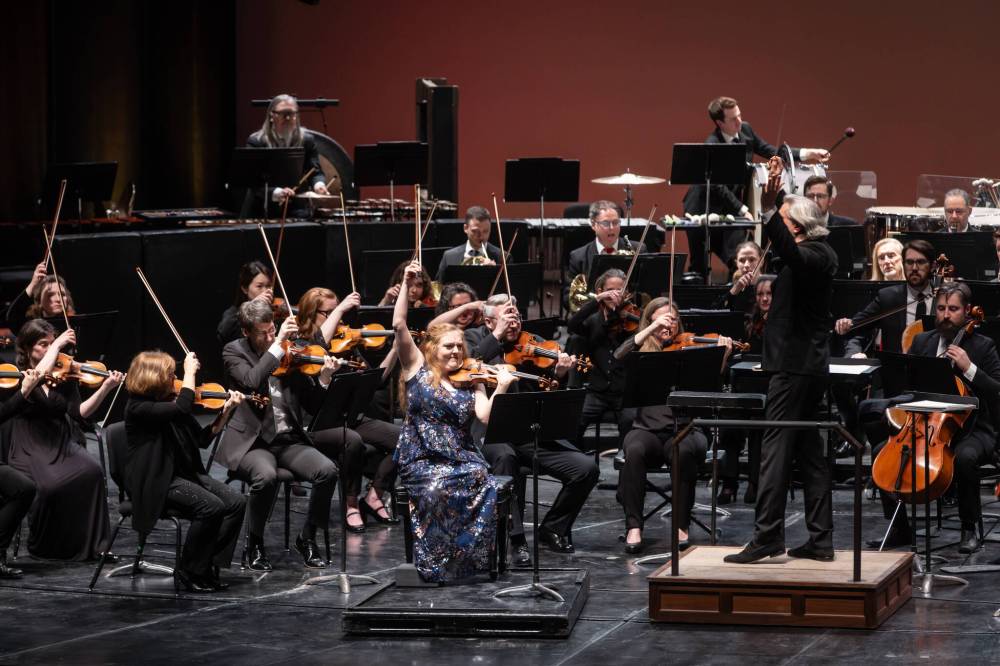Concerto plumbs peril and promise of transformative tech
Advertisement
Read this article for free:
or
Already have an account? Log in here »
To continue reading, please subscribe:
Monthly Digital Subscription
$1 per week for 24 weeks*
- Enjoy unlimited reading on winnipegfreepress.com
- Read the E-Edition, our digital replica newspaper
- Access News Break, our award-winning app
- Play interactive puzzles
*Billed as $4.00 plus GST every four weeks. After 24 weeks, price increases to the regular rate of $19.00 plus GST every four weeks. Offer available to new and qualified returning subscribers only. Cancel any time.
Monthly Digital Subscription
$4.75/week*
- Enjoy unlimited reading on winnipegfreepress.com
- Read the E-Edition, our digital replica newspaper
- Access News Break, our award-winning app
- Play interactive puzzles
*Billed as $19 plus GST every four weeks. Cancel any time.
To continue reading, please subscribe:
Add Free Press access to your Brandon Sun subscription for only an additional
$1 for the first 4 weeks*
*Your next subscription payment will increase by $1.00 and you will be charged $16.99 plus GST for four weeks. After four weeks, your payment will increase to $23.99 plus GST every four weeks.
Read unlimited articles for free today:
or
Already have an account? Log in here »
Hey there, time traveller!
This article was published 28/02/2025 (237 days ago), so information in it may no longer be current.
Not that long ago — Jan. 30, 2019, to be precise — a sea of headbangers stormed the Centennial Concert Hall to be among the first to hear Haralabos (Harry) Stafylakis’s Weighted, which saw American prog-metal band Animals as Leaders cranking up the volume with the players of the WSO.
Fast forward to now: although those same metalheads appeared to be MIA this time, the WSO’s composer-in-residence and co-curator of the Winnipeg New Music Festival took 785 listeners on another white-knuckle roller-coaster ride during the world première of his Violin Concerto: On a Path to Singularity.
Thursday night’s 80-minute (no intermission) program, part of the WSO’s Thursdays Classics series led by Daniel Raiskin, showcased world-renowned violinist Rachel Barton Pine.

MATT DUBOFF PHOTO
Winnipeg Symphony Orchestra conductor Daniel Raiskin leads renowned violinist Rachel Barton Pine during the WSO’s Thursdays Classics series at the Centennial Concert Hall.
MATT DUBOFF PHOTO Winnipeg Symphony Orchestra conductor Daniel Raiskin leads renowned violinist Rachel Barton Pine during the WSO’s Thursdays Classics series at the Centennial Concert Hall.
Stafylakis (who was in attendance) has never shied away from asking the bigger questions of life. His latest intensely dramatic work was sparked by the increasing perils (and promise) of artificial “super-intelligence,” a.k.a. ASI, which threatens humankind with its own extinction.
The premise is more than timely, and indeed, many moments during the highly visceral, 28-minute piece chill to the bone. The NYC-based composer immediately establishes his scorched-earth sound world with Pine, a fellow metal devotee. Her initial, frantic shrieking entry on her amplified fiddle was further heightened by thundering timpani rolls, belching brass, pungent tone clusters and vertigo-inducing string glissandi.
Following a brief Q&A with the composer onstage, Raiskin, an ideal creative partner to bring Stafylakis’s music to life, attacked the work like a lion, maintaining cohesion throughout its nine shorter movements, which flow together as one.
Pine’s virtuosic artistry was equal to the music’s extremes, in which listeners were lulled into a comforting cocoon of false security, before being plunged again into the composer’s destabilized landscape.
The piece proved most compelling when Pine — loosely representing “mechanized technology” — became fully integrated with the orchestra as “humanity,” with precious few moments of repose in between.
Some of those arrived later during a few all-too-fleeting woodwind solos that felt more like a token nod (or arguably, the ghostly vestiges of a more traditional “adagio” movement) than a more substantive contrast; nonetheless, other interpolations, including Pine’s unabashedly rhapsodic themes, or the orchestra’s propulsive, rhythmic hooks provided both emotional ballast and structural backbone.
It ultimately led to a triumphant finish, including an oddly major final chord (the jury’s still out as to whether ASI or humanity was the victor).
Such are Stafylakis’s thought-provoking works, which pose potent questions rather than provide pat answers, leaving listeners to draw their own conclusions.
In response to a roaring standing ovation, Pine performed an encore of Paganini’s Caprice No. 24, describing the 19th-century Italian artist as “the world’s first rock star,” further quipping, “Maybe someday a robot will be able to play this piece and I’ll never have to practise it again” before tossing off the devilishly difficult solo as easily as child’s play.
The evening opened with the WSO première of late Ukrainian composer Hanna Havrylets’s Chorale for Strings, with the maestro noting, during his introductory remarks, last Monday’s sombre three-year anniversary of the Russian invasion of Ukraine, which ultimately cost the composer her life.
With utmost sensitivity, Raiskin led the players through its hushed, plaintive theme, first heard in the violins and gradually expanding as a cry from the depths, in this deeply stirring performance.
Dvorak’s Symphonic Variations, Op. 78, last heard here in 1985, rounded out the program, featuring 27 variations based on the Czech composer’s own folk song, The Fiddler. It’s admittedly challenging to listen to the same 20-bar theme repeated nearly 30 times (albeit in various guises), however, Raiskin’s animated approach, including setting a welcome brisk pace, kept the roughly 23-minute piece moving, capped by a clearly articulated, buoyant fugue that drew another standing ovation from the mixed-age crowd.
holly.harris@shaw.ca



